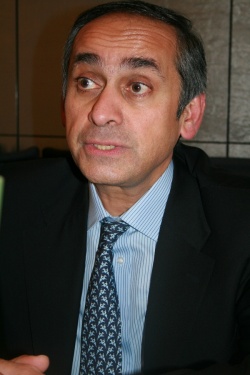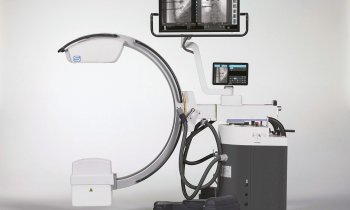Quality is the route to improving healthcare
John Brosky reports
Changing for the better does not depend on the number of hospitals, physicians or beds you have; it’s about eliminating inefficiencies in the pathways of patient care. The organising principle for healthcare needs to be quality. ‘It is the one industry where quality is cheaper,’ emphasises Ari Darzi, renowned pioneer in minimally invasive and robotic surgery, holder of the Hamlyn Chair of Surgery at Imperial College (London), and officially known as The Right Honourable The Lord Darzi of Denham.


His main clinical and academic interest lies in MIS and related technologies. With his research team Lord Darzi covers a broad spectrum, including medical image computing, biomedical engineering, clinical safety and robotics -- his robot-assisted techniques earned him the nickname ‘Robo Doc’.
Lord Darzi of Denham arrived at Medica 2010 describing himself as an ambassador for healthcare and life sciences and ‘proud to be wearing the British hat.’
Had he come as a buyer or a seller? ‘A bit of both, actually,’ Ari Darzi explained. ‘We have some 300 companies here for exporting, and I’m meeting with them, as well as with larger companies, such as Panasonic, who represent an inflow as investors interested in establishing operations in England.’
As Parliamentary Under-Secretary of State (2007-09) and Labour Government Spokesperson (2007-09), Lord Darzi led a year-long review of the National Health Service (NHS) that resulted in a report calling for a controversial overhaul of the system.
The ‘Next Stage Review’ outlined a plan that would redefine primary care delivery across England and the NHS and provided £2 million in funding for 10 regional Strategic Health Authorities to support frontline NHS staff in developing innovative ideas.
‘Quality needs to be the organising principle for healthcare, which is the one industry where quality is cheaper, ‘ he told European Hospital. ‘Quality is not only an end in itself for outcomes but a means for reducing expenses. It is not quality that is straining healthcare systems today, but the large-scale of inefficiencies in those systems.
‘When we look at the manufacturing of a diagnostic test seen here at Medica, with the efficiencies of moving it through the supply chain, and then if we map out the inefficiencies in a patient pathway for care where that diagnostic test is used, the contrasts are startling. If we get that right in healthcare, we will save huge sums of money.’
Lord Darzi then illustrated his approach, outlining where he sees waste in the UK’s complex patient pathway for treating chronic long-term diseases.
‘It is the same when we look at even a more simple case for a patient having planned care,’ he said, describing how the patient visits the general practitioner (GP), is sent on to a specialist, then sets an appointment to have medical imaging, returns to the specialists, then to the GP, waits for a decision on a procedure, then waits for a pre-operative assessment. ‘The process goes on and on’, he said.
Looking at the same process from a patient’s point of view helps to indicate the areas where unnecessary steps can be eliminated, he said.
[bild-2]Similarly, he advocates greater patient participation in determining the success of outcomes.
‘Quality is not based purely on outcomes from the perspective of the clinicians,’ he said, ‘but quality should also be based on the patients’ experience -- on what a patient thinks of the healthcare outcome.
‘We have introduced patient-related outcomes as a formal measure in the NHS. It’s no longer me repairing someone’s hip and declaring it a good outcome, but including the patient’s input saying that they have no experience of any change,’ he explained.
‘That is how you change healthcare systems. Not by looking at healthcare in terms of the number of hospitals, physicians, or the number of beds, but examining the pathways of care.
‘The motto we repeated when redesigning the services is, "Centralise where necessary, decentralise where possible". When we are treating stroke disease, there really is a need for a centralised stroke unit to image the brain and for injecting a thrombolytic agent,’ he said. ‘But for the treatment of diabetes, why are we bringing everyone into the hospital? Instead we have proposed shifting specialists into the communities. The same can be true for chronic disease, or expertise in rheumatology and gerontology.’
Among the vast displays of products at Medica, Lord Darzi sees the future in Halls Two and Three, which were dedicated to bio-chemical assays. ‘The impact of molecular diagnostics is going to be a complete disrupter and will force a rethinking of the models of healthcare,’ he said. ‘There are tremendous opportunities in diagnostics for pre-emptive treatment, more personalised care and greater patient participation in that care.’
28.12.2010





